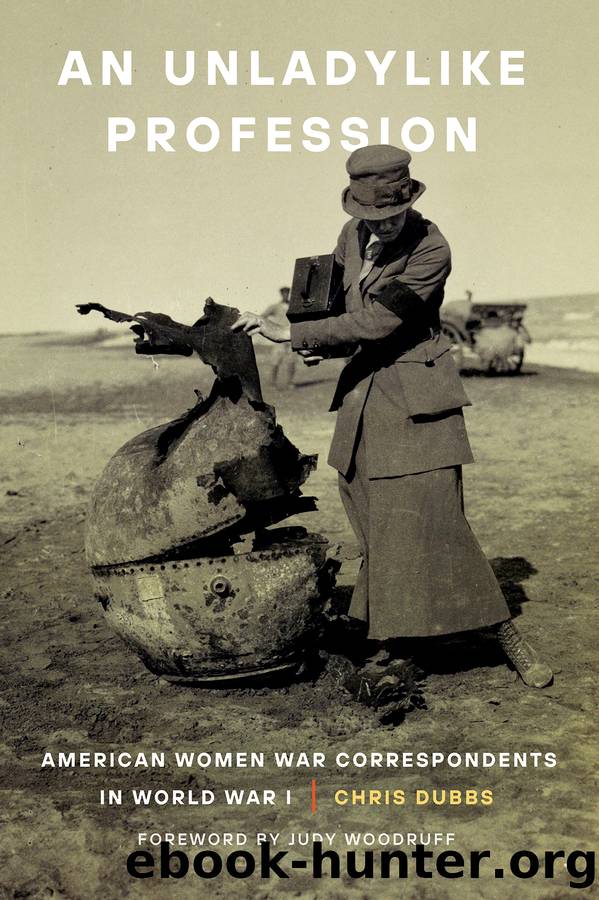An Unladylike Profession by Chris Dubbs

Author:Chris Dubbs [Dubbs, Chris]
Language: eng
Format: epub
Tags: HIS027090 History / Military / World War I, SOC028000 Social Science / Women's Studies, BIO025000 Biography & Autobiography / Editors, Journalists, Publishers
Publisher: Potomac Books
* * *
By 1916 the New York World had also concluded that the reporting coming out of Germany had lost objectivity. The World already had a correspondent in Germany, Karl von Wiegand, but it was felt that, through sympathy or censorship, his reporting had become too friendly to the German cause, whereas the reporting found elsewhere in the Allied press went to the opposite extreme of consistently demonizing Germany. The World’s energetic young city editor, Herbert Bayard Swope, known for his scrupulous accuracy and objectivity, was just the right person to bring a balanced perspective to the issue. A visit to Germany early in the war had left Swope with a deep appreciation for the German people and the country’s military capabilities.
Unlike Gallison’s or Doty’s first-person narrators, buffeted by their German impressions, Swope adopted the detached tone of an objective observer. Although he reached the same superficial conclusion as Doty—“Life in Germany is not pleasant to-day”—he gave more weight to Germany’s organizational ingenuity in sustaining its war effort. The somber mood that now gripped the country was in fact a measure of its strength.
Having been in Germany at the start of the war, Swope could compare the mood of 1914 to that of 1916. When he did, two major shifts in attitude became clear. The buoyant arrogance with which Germany went to war had disappeared. German thinking had shifted from confidence of certain victory to fear of defeat. The slogan on everyone’s lips had gone from siegen (conquer or win) to durchhalten (stick it out or hold on), exposing an iron resolve that would certainly keep the country in the war. Not everyone in Germany had supported a war of conquest, but everyone, with all their fiber, supported a war for the continued existence of Germany. Swope left the country in September convinced that Germany could not conquer Europe but also that it could not be defeated.
Swope’s articles ran on the front page of the World in October and November 1916, simultaneous with Doty’s articles in the New York Tribune. When their articles appeared as books in March 1917, it caused at least one reviewer to scratch his head: “Here’s a pretty state of affairs for the seeker after truth.” The same publisher (Century Company) published both books, within weeks of each other. Both books collected the articles written about their author’s visit to Germany in late 1916, and yet they formed different opinions: Swope concluded that Germany could hold on indefinitely and Doty that discontent and hunger could soon lead to revolution. Given that the United States stood on the precipice of entering the war, it was more than an academic dispute.
Because their news gathering followed such parallel trajectories, it also put on display contrasting styles of reporting. As reviewers noted, Swope’s objective writing was distinguished by its thoroughness in assessing the military, social, and economic conditions without resorting to the sensationalism or sentimentalism common in much war reporting. On the other hand, one reviewer lauded Doty’s anecdotal, impressionistic
Download
This site does not store any files on its server. We only index and link to content provided by other sites. Please contact the content providers to delete copyright contents if any and email us, we'll remove relevant links or contents immediately.
| Afghan & Iraq Wars | American Civil War |
| American Revolution | Vietnam War |
| World War I | World War II |
Waking Up in Heaven: A True Story of Brokenness, Heaven, and Life Again by McVea Crystal & Tresniowski Alex(37004)
Empire of the Sikhs by Patwant Singh(22172)
We're Going to Need More Wine by Gabrielle Union(18073)
Hans Sturm: A Soldier's Odyssey on the Eastern Front by Gordon Williamson(16630)
Leonardo da Vinci by Walter Isaacson(11903)
The Radium Girls by Kate Moore(10907)
Educated by Tara Westover(7062)
Tools of Titans by Timothy Ferriss(6947)
How to Be a Bawse: A Guide to Conquering Life by Lilly Singh(6693)
The Last Black Unicorn by Tiffany Haddish(5075)
Permanent Record by Edward Snowden(4998)
The Rise and Fall of Senator Joe McCarthy by James Cross Giblin(4843)
Promise Me, Dad by Joe Biden(4447)
The Wind in My Hair by Masih Alinejad(4424)
The Crown by Robert Lacey(4105)
A Higher Loyalty: Truth, Lies, and Leadership by James Comey(4033)
The Iron Duke by The Iron Duke(3639)
Joan of Arc by Mary Gordon(3258)
How to be Champion: My Autobiography by Sarah Millican(3186)
